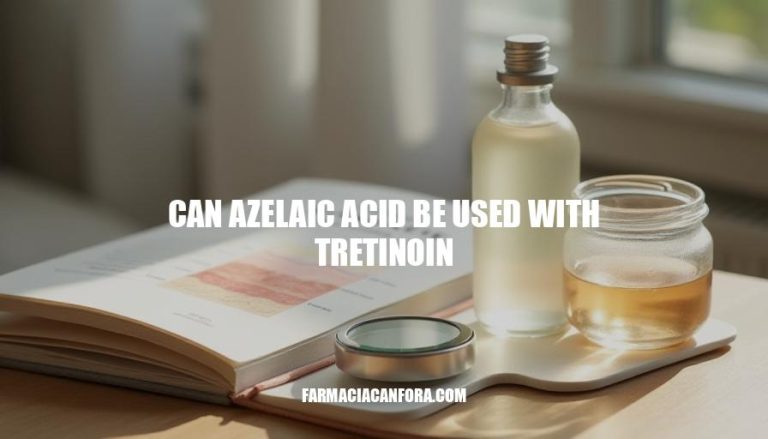


Azelaic acid and tretinoin are two powerful ingredients in skincare. Azelaic acid is gentle yet effective. It reduces redness, unclogs pores, evens out skin tone, and fights acne-causing bacteria.
Its mild exfoliating action improves skin texture without being harsh.
Tretinoin, a derivative of vitamin A, is great for anti-aging and fighting acne. It clears clogged pores, reduces fine lines, and improves hyperpigmentation. Tretinoin also stimulates collagen production, giving you a more youthful and resilient complexion.
When used together, these ingredients can address many skin concerns.
Azelaic acid‘s calming properties complement tretinoin’s intense renewal effects, making them great for acne-prone or uneven skin. Azelaic acid’s soothing qualities might also counteract some of the irritation that tretinoin can cause, creating a balanced skincare duo.
Azelaic acid and tretinoin can be used together in a skincare routine, but careful consideration is necessary to minimize irritation and maximize benefits. Here’s how to incorporate them effectively:
Application Order:
Start with a clean face by using a gentle cleanser.
Apply tretinoin first, as it is a prescription-strength retinoid that works best when in direct contact with the skin.
Wait for 15-20 minutes after applying tretinoin to allow it to fully absorb.
Follow with azelaic acid. This ingredient has anti-inflammatory and antimicrobial properties, making it suitable for layering after tretinoin.
Frequency:
Begin by using tretinoin 2-3 times a week to allow your skin to adjust, as it can cause dryness and irritation initially.
Introduce azelaic acid on alternate nights or mornings, depending on your skin’s tolerance. Gradually increase the frequency of both products as your skin builds tolerance.
Compatibility Concerns:
Both ingredients can cause dryness and sensitivity, so it’s crucial to monitor your skin’s reaction.
If irritation occurs, reduce the frequency of use or apply a moisturizer as a buffer before tretinoin.
Always use sunscreen during the day, as tretinoin increases sun sensitivity.
Additional Tips:
Avoid using other potent actives like AHAs, BHAs, or vitamin C in the same routine to prevent overloading the skin.
Consult a dermatologist if you have sensitive skin or specific concerns like rosacea or severe acne.
This combination can be highly effective for addressing acne, hyperpigmentation, and uneven skin texture when used correctly.
To combine these ingredients effectively:
Begin by using tretinoin 2-3 times a week to allow your skin to adjust, as it can cause dryness and irritation initially. Introduce azelaic acid on alternate nights or mornings, depending on your skin’s tolerance, and gradually increase the frequency of both products as your skin builds up.
Monitor your skin’s reaction closely, as both ingredients can cause dryness and sensitivity. If irritation occurs, reduce the frequency of use or apply a moisturizer before tretinoin. Always use sunscreen during the day, as tretinoin increases sun sensitivity.
Avoid using other potent actives like AHAs, BHAs, or vitamin C in the same routine to prevent overloading the skin. Consult a dermatologist if you have sensitive skin or specific concerns like rosacea or severe acne.
This combination can be highly effective for addressing acne, hyperpigmentation, and uneven skin texture when used correctly.